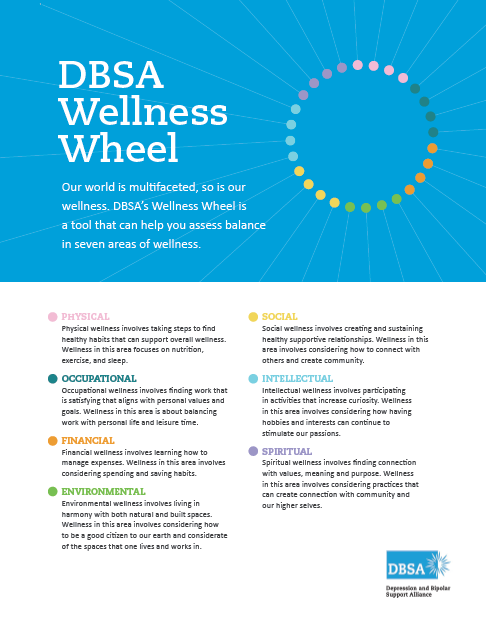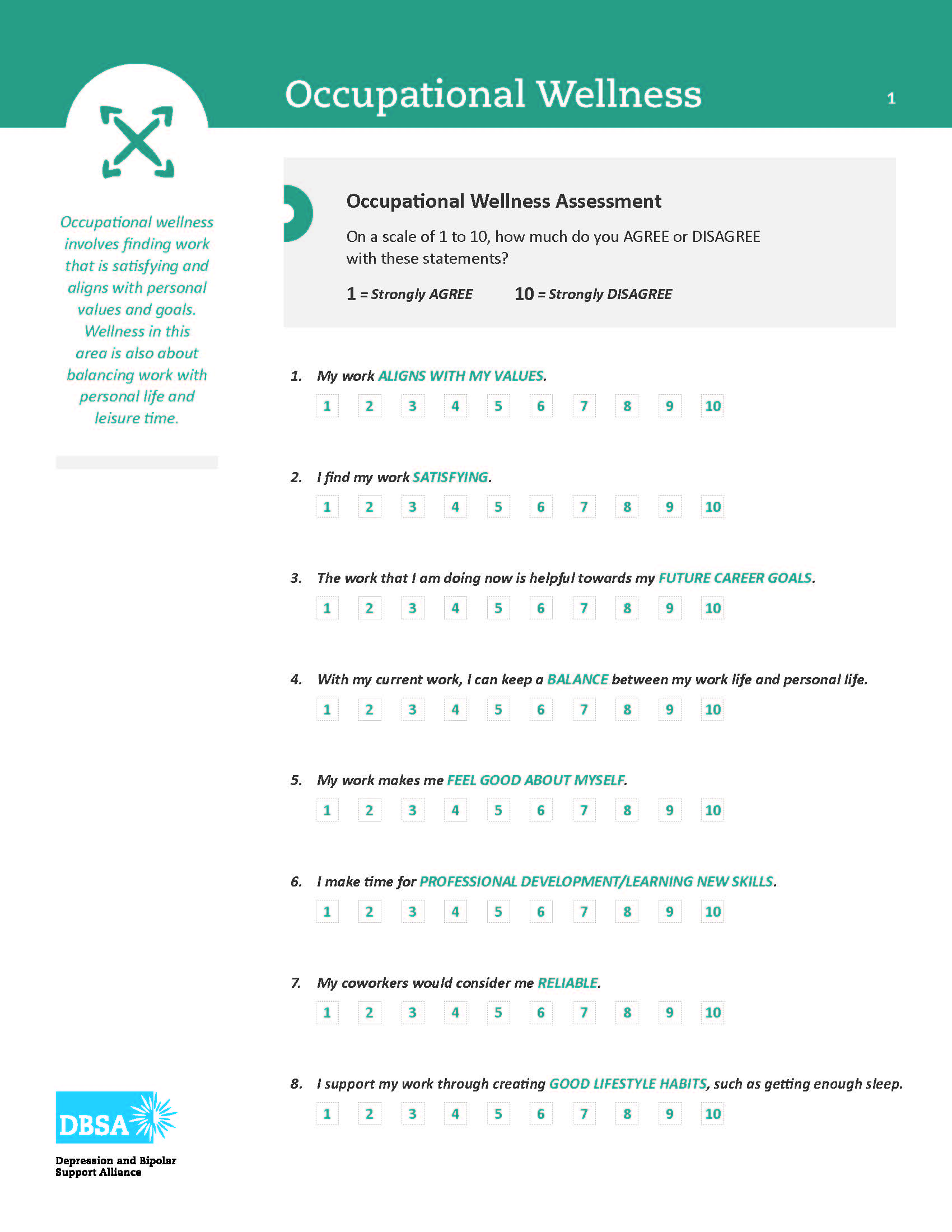No two people define work and career exactly the same way. Many work full-time or part-time outside the home, while others devote their energies to family and household needs. All of this work is important, even if some of it is not paid. Many people also have thriving careers as volunteers and community leaders. Whatever shape your working life takes, you may find that living with a mood disorder can make work more challenging. DBSA’s Wellness Wheel provides tools to help you see your strengths and design a work style that gives you a sense of purpose and fulfillment.
Wellness at work
Since we spend a large part of our waking hours working – including unpaid work – it’s clear that mood disorders can affect this part of our lives. For example, if you live with depression, you may experience periods of decreased interest in work, or a lack of pleasure in everyday tasks. Depression can cause fatigue that makes it harder to concentrate or to simply make it to work on a day-to-day basis.
If you live with bipolar disorder, you may face some of these symptoms, while at other times attempting to manage mania or hypomania. While the feeling of high energy may make you feel more goal-oriented, you may notice that normal workflows are interrupted. Racing thoughts may distract you, making it difficult for you to complete work or avoid mistakes.
The key to a healthy relationship with work is finding the right work style and setting for you, allowing you to stay balanced and take care of yourself.
Tips to help you while you work
Choose a work environment that fits your needs
Think about what type of work you enjoy. Do you like to interact with people and work on a team, or do you prefer independent work behind the scenes? Do you thrive in an environment with more structure, or do you need more flexibility? When exploring new work opportunities, remember that the fit must be good for both you and the organization you serve. If you’re unhappy with your working life, the people you work with may feel the effects, too – so it’s essential to find the place you will feel valued and comfortable.
Take breaks
It is okay to step back from work when you are feeling stressed. In fact, taking breaks throughout the day can help you be more productive. Take a quick walk, talk to a friend or coworker, or do a short meditation to recharge your energies.
Find a routine that works
A consistent routine helps make work days easier to manage. Set yourself up for success by considering what time of day you do your best work and finding a schedule that aligns with your natural rhythms. Think about your morning routine, your commute, and your post-work routine when considering the best way to arrange your day.
Ask for support when you need It
While you do not need to tell your employer or co-workers that you live with a mental health condition, it is always okay to ask for help. If you are feeling particularly stressed about a project, see what accommodations can be made. If you are not comfortable discussing your mental health condition at work, talk with a trusted friend, a therapist or support group members for tips and strategies.
Take things at your own pace
Being productive and timely is important, but you will need to find a rhythm that works for you. Work with your supervisor and colleagues to determine a comfortable pace. More than anything, good communication is key.
Find tools that keep you on track
As you develop a work style that fits you, look for tools that help you stay organized and on track. You might find it works to keep lists in a notebook or track projects in a paper planner. Or you may prefer using an app on your computer or phone. There are plenty of options available, so don’t be afraid to test a few out to determine what works best for you.
Remember, you are not your symptoms or your diagnosis
Your mood disorder is one aspect of your overall wellness, but it does not define who you are as a person, a family member, an employee or a volunteer. Viewing your working life in perspective helps you see the value you bring to others and take pride in the contributions you make.
Your rights and resources at work
The following information will be most helpful for those who are employed outside the home, whether part-time or full-time.
Disclosing your mental health condition to others
It is your choice whether or not to talk about your mental health condition with your supervisor or co-workers. You may decide not to tell anyone at work that you live with a mood disorder. If you do choose to discuss your condition, people may ask for more information, since they may know very little about depression or bipolar disorder. Be prepared to give a little background on what living with depression or bipolar means.
You may need to discuss your condition with your supervisor if you need special accommodations. These may include shorter days, special hours, time off, or changes in your job responsibilities. You may need to ask for a more regular work schedule that doesn’t disrupt your sleep. Bring some educational materials about depression or bipolar if you think it will be helpful. You may also want to bring a letter from your health care provider. Let your supervisor know what you need and how it will help you succeed at work.
Taking time off
It is very important to take care of your health. This means taking advantage of paid sick leave or vacation time when you need it. If you don’t have enough leave time, there may be other options you can work out with your supervisor.
Short-term or long-term disability insurance is offered by some employers. These policies allow employees to take time off with a percentage of their pay if they are ill or injured. Review your employee handbook to find out what your employer provides. You can also buy a policy on your own. Your human resources contact at work should also be able to assist you with your company’s policies.
The Family Medical Leave Act (FMLA) is a law that allows employees to take up to 12 weeks of unpaid leave in a given year to care for themselves or family members. For more information on FMLA, call 1-866-772-1213 or visit the Social Security Administration page.
Your employer may also offer employee assistance programs, which include free and confidential access to services such as counseling and referrals to mental health professionals. You can learn more about employee assistance programs from the U.S. Office of Personnel Management.
Laws to protect you at work
The Americans with Disabilities Act (ADA) protects individuals with disabling conditions, which can include mental health concerns. More information about ADA is available by calling the U.S. Department of Justice ADA Information Line at 1-800-514-0301 or visiting the ADA website.












